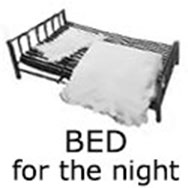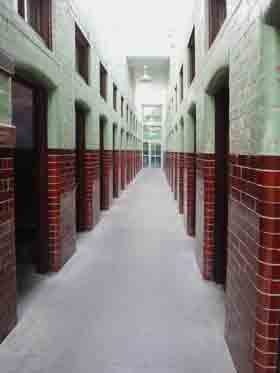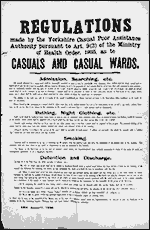How the casual ward system provided beds for the homeless

In Victorian times until the 1930s, no-one was denied a bed for the night inside a specially designed building called a casual ward. Casual wards existed in most major towns around the country. Read this page to learn about them, the terms used to describe them, the homeless individuals who used them, how they were funded and how they were different from workhouses. Then decide whether you think that today’s homeless who sleep outdoors under whatever shelter they can find would want to swap if they could.
____
Extracted from the memoirs of the webmaster's mother (1906-2002) and edited by the webmaster with further research
What casual wards were
Casual wards were parish-funded institutions which would accommodate homeless people from outside that parish free of charge but only for just one night. Then these individuals would be moved on to trudge to another casual ward in a different parish.
Other terms for casual wards: spikes and doss-houses
Casual wards were often known informally as 'spikes', possibly after the tool used there for rope-teasing.
A 'doss-house' was a derogatory term for a casual ward and any low-cost overnight accommodation such as those run by charities. The term continued to be used for some time after the end of casual wards to describe cheap, untidy or dirty accommodation, but it is seldom heard today.
Tramps, casuals and vagrants
A 'tramp' was the everyday word used by the public for the men who had to trudge - or tramp - from one casual ward to another for the next night's sleep and basic sustenance.
In the past, tramps were common daytime sights on the streets and in queues waiting for casual wards to open. They were clearly ill-nourished and usually in dirty, ragged clothes. People avoided them unless it was to offer them a few hours' work or unwanted clothes. After the end of casual wards, the 'tramp' term continued to be used to imply disrespect to an individual, but it is now out-dated. The term 'toe-rag' was used to imply insult in addition to disrespect. It was derived from the rags that tramps with ragged or no shoes wrapped round their toes and feet for protection on their long trudges between casual wards. You can imagine the state that these rags were in.
In official documents the term tramp was not used; it was 'vagrant', 'casual' or even 'pauper'. In everyday speech, though, pauper and beggar were more used to describe the down-and-outs who sat in the street begging for money.
Difference and similarities between casual wards and workhouses
Main differences and similarities between casual wards and workhouses were:
- Whereas workhouses were for poverty-stricken local people - the emphasis being on local - casual wards were for the poverty stricken of no fixed address. This meant that no parish felt much of a responsibility for them which was why casual wards were even more basic than workhouses.
- Whereas poverty-stricken individuals lived in workhouses until such a time as they could find work and leave, inmates of casual wards were only permitted to stay one night, whereupon they had to get to a different casual ward. Their only means of transport was trudging - or tramping - to the next casual ward. This gave rise to their name as tramps.
- Inmates of casual wards, like those of workhouses, were expected to work for their keep, although there are some differences in the types of work that they were expected to do - see work in a workhouse and work in a casual ward.
- Conditions were extremely harsh in both workhouses and casual wards - but if anything worse in casual wards - see the daily schedule in casual wards and life in workhouses.
- I understand that the sleeping arrangements in a workhouse were different from those in a casual ward, but this may not necessarily have been the case everywhere. If you know, please contact me. At Guildford spike, the inmates slept in locked cells. The photo shows the doors to the cells off a corridor.

The main corridor showing the doors of the cells. Photographed with permission in Guildford Spike
- Workhouses and casual wards were both normally on the same site along with the local hospital, known as the infirmary, but they were not necessarily in the same building.
- Both workhouses and casual wards were funded by their local parish and managed by its Board of Guardians.
- Workhouses would accept inmates at any time of day, but casual wards were closed during daytime. I could watch them lining up outside our local casual ward as I came home from school. I think they were allowed in at 7 o'clock, but I can't be sure. They looked such a ragged and impoverished bunch. In winter they were all shivering with the cold.
Food
The food supplied by casual wards was similar to the food in workhouses with the exception that inmates of casual wards were turned out before lunch. On leaving the casual ward (after undertaking the required work), the inmates - now tramps or vagrants - were given enough money for the most basic of food for the day, but for additional food or clothes they relied on charity or small-scale theft. Tramps' lives were hard - see the page on their daily schedule.
Were vagrants and tramps thieves and villains?
Tramps suffered from serious malnutrition and inadequate clothing, so it is not surprising that some turned to crime. Consequently they were often known in the community as rogues, thieves and villains and widely regarded with caution by the rest of the community. They were given a wide berth as potential criminals and were certainly regarded as the lowest of the low. They were even looked down on by the inmates of workhouses.
The management and funding of casual wards
Casual wards, like their associated workhouses, were managed locally by a Board of Guardians. For many years my uncle was chairman of our Board of Guardians for Edmonton.
Casual wards were a cost to the parish and it is likely that this was the excuse for their extremely basic standards.
Staffing and the tramp major
Day-to-day staffing of casual wards was in the hands of individuals known as 'majors' or 'tramp majors'.
According to Orwell, tramp majors were generally inmates from the workhouse who were paid for their work.
Rules and regulations in casual wards
Although posters of rules and regulations in workhouses are not hard to find in museums, similar posters are somewhat rare for casual wards. The following was generously supplied by Joe Staines from the effects of his father. It is too large for a website page, but you can read it by tap/clicking the following thumbnail or reading the transcript which follows. It is worth reading. Below that are my comments on the poster:
REGULATIONS poster transcript
Made by the Yorkshire Casual Poor Assistance Authority pursuant to Art. 9(3) of the Ministry of Health Order, 1935, as
CASUALS AND CASUAL WARDS
Admission, Searching, etc.
All casuals admitted to a casual ward shall be thoroughly searched as soon as may be practicable after admission, their clothing shall be dried, stoved and/or disinfected as may be necessary or expedient, and any property belonging to, or in the possession of, such casuals shall be taken from them, and examined in their presence, shall be sufficiently labelled with the name or number of the casual, properly stored in suitable receptacles, and, except in the case of money, for which an official receipt shall be given, returned at the time of discharge. Casuals shall not be permitted to retain in their possession articles of food (such as tea, sugar, meat, bacon, etc.), which shall be dealt with as above provided for other articles of which the casual may be possessed.
The making of tea from any stock in possession of the casual is prohibited, the dietary provided pursuant to the Regulations being considered to be ample to meet all necessities.
Money found in the possession of a casual shall be taken from him to be applied towards the cost of his maintenance at the rate of 1/- (shilling) per night, subject, however, to the proviso that if the amount in the possession of the casual is not more than 1/- such amount shall be disregarded.
Bathing, Night Clothing, etc.
Each casual shall be bathed in clean warm water as soon as may be convenient after admission unless there is reason to believe that bathing would be injurious to his health. Each person shall be supplied with a towel which has not been used by any other person since it was last washed.
Suitable night clothing, which has not been worn by any other person since it was last washed. shall be supplied to him at night. The personal clothing of the casual shall be taken away each night, suitably labelled and stored, and returned to him in the morning.
Adequate bedding (according to the season of the year) shall be provided for each casual. If pillows are provided, they should be covered with a "pillow slip" which has not been used since it was last washed.
Smoking.
Smoking shall be permitted on the day of detention for 30 minutes after the mid-day meal and after the completion of the allotted task in the evening. This provision shall only have effect in such wards or departments as may be approved by the Council.
The Master of the Institution (or in the case of separate casual wards, the Superintendent) may withhold permission to smoke if the tasks of work are inadequately performed, or as a disciplinary measure.
Detention and Discharge.
Section 44 of the Poor Law Act, 1930, provides as follows, viz.:
"44.-(1) A casual poor person shall not be entitled to discharge himself from a casual ward before the hour of nine o'clock in the morning of the second day following his admission, nor before he has performed the work prescribed for him in accordance with this Act.
(2) Where a casual poor person has been admitted on more than one occasion during one month into any casual ward of the same county or county borough, be shall not be entitled to discharge himself before the hour of nine o'clock in the morning of the fourth day after his admission. and he may at any time during that interval be removed by any officer of the county or county borough council concerned with the relief of the poor, or by a police constable, to a workhouse of the county or county borough, and be required to remain in the workhouse for the remainder of the period of his detention.
(3) In computing the number of days during which a casual poor person may be detained under this section, Sunday shall not be included."
Subject to the foregoing enactment, a casual will not be allowed to discharge himself before the morning of the second day after admission, unless:-
(a) He is the holder of a current "Vacant Ticket," ISSUED AT A LOCAL OFFICE OF THE MINISTRY OF LABOUR. or
(b) He is able to prove that he has obtained employment or has a reasonable chance of securing work; in which case he may, at the discretion of the Master (or, in the case of a separate casual ward, the Superintendent), be allowed to take his discharge in the morning of the day (excluding Sunday. Christmas Day and Good Friday) following his admission.
24th January, 1936.
- Although tramps were only allowed to stay for a single night, there seems to be no official period stated here about when they could return. George Orwell however, a few years previously and speaking for the wider London area, states that tramps were not allowed to return within a month. Probably this was at the discretion of the local Board of Guardians. Apparently tramps who returned too often were removed to a workhouse in another area.
- Note that although the inmates, which the poster refers to as casuals, were 'officially' provided with a clean towel after bathing, their clothes were merely disinfected. In practice it is doubtful how far the cleanliness of the towels and bedding were actually implemented. Again, see George Orwell's experience of bathing and washing.
- The poster states that the inmates had to pay towards their keep if they had as much as a shilling, whereas George Orwell gave the amount as eight pence (where 12 pence equalled a shilling). Was this inflation? Or did the local committee in 1936, now freed from national requirements, feel free to raise the amount?
- The date of 24th January 1936 shows that this particular casual ward was one of the last to close. It is difficult to find the actual date when workhouses and casual wards were legally required to close, but The 1929 Local Government Act abolished the Boards of Guardians which managed them to be replaced by local committees, and this in turn affected workhouses and casual wards. Note that this poster was created by a Casual Poor Assistance Authority, not a Board of Guardians. Presumably local authorities had a certain amount of leniency over when and how to make the change. Clearly it was cheaper for them to delay as long as possible.
The end of casual wards: the Welfare State
Although casual wards and workhouses officially closed during the 1930s, they continued in various forms and with different names until the establishment of the welfare state, just after the Second World War.
| sources | webmaster | contact |
Text and images are copyright
If you can add anything to this page or provide a photo, please contact me.




